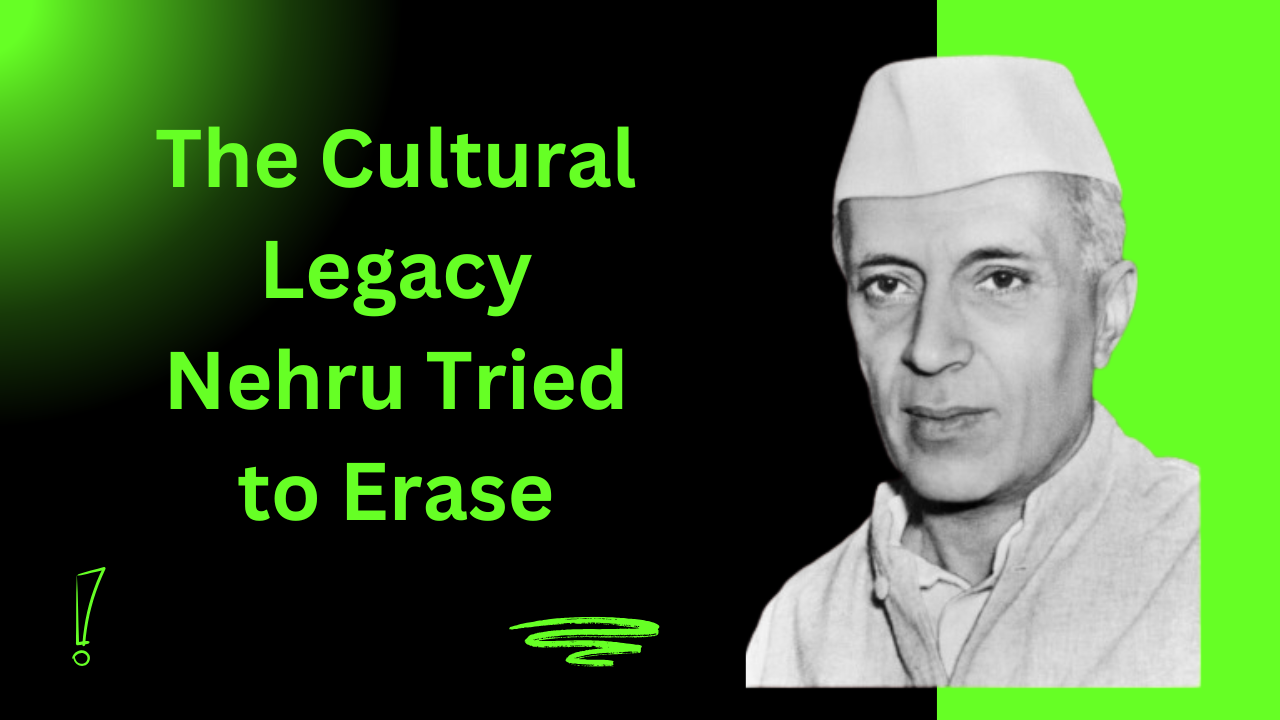Watch the Video: https://youtu.be/ZRV4p3YvMEw
Jawaharlal Nehru, India’s first Prime Minister, was a man of remarkable intellect and a pivotal figure in the nation’s struggle for independence. Yet, his legacy remains controversial, especially regarding his views on Indian culture. Nehru’s modernist ambitions, shaped by Western education and secular ideals, often put him at odds with the cultural heritage of India. His own words suggest a desire not just to reshape, but to “destroy” certain aspects of Indian culture that he believed impeded progress. This article critically explores Nehru’s stance, examining the costs of his modernist agenda on India’s cultural identity and questioning whether his approach served or undermined the country.
Nehru’s Background and His Alienation from Indian Culture
Jawaharlal Nehru was educated in England, first at Harrow and later at Cambridge University, where he absorbed Western ideologies that favored rationalism, secularism, and progressivism. His education fostered a worldview that embraced science and modernity while viewing religious traditions and cultural practices as outdated. Nehru famously described himself as “a Hindu by birth, a Muslim by culture, and a British by education and outlook,” suggesting a detachment from the cultural and spiritual identity that resonated with many Indians.
While this exposure to diverse ideas could have enriched his leadership, it instead led to a critical stance toward Indian culture. Nehru viewed much of India’s ancient heritage as irrelevant in the context of modernity. His detachment often translated into disdain for traditional practices, and he sought to reshape India according to his vision of a secular, industrialized nation. Nehru’s ambition to overhaul India’s identity was not an act of evolution but rather a rejection of the cultural and spiritual bedrock of Indian society.
The 1953 French Delegation Incident: Nehru’s Clear Rejection of India’s Heritage
One of the most telling instances of Nehru’s attitude towards Indian culture was his interaction with a French delegation in 1953. The delegation visited various Indian cultural centers like Pondicherry and Banaras, gaining a deep appreciation for India’s rich traditions and history. In their meeting with Nehru, they praised the culture they encountered, calling it humane, profound, and inspiring. To this, Nehru reportedly responded, “You are praising the very thing I am trying to destroy.”
This statement reveals Nehru’s outright hostility toward the cultural heritage that many saw as the soul of India. His response dismisses not only the positive views of India’s culture but also negates the importance of India’s unique identity. For centuries, foreign travelers like Fa Hien, Al-Biruni, and Hsuan Tsang had marveled at India’s knowledge, spiritual depth, and societal structure. Nehru’s dismissal, therefore, represents not just a rejection of contemporary praise but an outright disdain for a heritage celebrated globally for its richness.
Nehru’s Modernization Agenda: Breaking with Tradition
Nehru’s vision of modern India was deeply influenced by Western ideals of development and industrialization. His policies aimed to transform India into a secular, industrial nation that would stand as an equal among global powers. While his intention was progress, his methods came at the cost of cultural alienation.
Nehru’s approach to modernization sought to break free from what he considered outdated customs and practices. He emphasized rapid industrialization, establishing industries, and focusing on infrastructure projects that he referred to as the “temples of modern India.” While these initiatives laid a foundation for economic growth, they also disregarded traditional livelihoods, community values, and the spiritual connections that rural communities had with their land. By prioritizing industrialization over India’s agrarian and artisan sectors, Nehru’s policies effectively dismissed traditional ways of life as irrelevant or inferior.
Nehru’s Secularism: A Disregard for Indigenous Religious and Cultural Practices
Nehru’s secularism was influenced by European ideas of separating church and state, a perspective that did not fully resonate with India’s unique cultural landscape. In Indian history, secularism was traditionally practiced as “sarva dharma sambhava,” meaning equal respect for all religions, not the removal of religious influence from public life. Nehru’s brand of secularism, however, sought to create a clear distinction between religion and state, often suppressing cultural expressions in the public sphere.
This form of secularism marginalized the indigenous spiritual traditions that had been integral to Indian identity. Nehru’s policies promoted a version of history that downplayed the role of religion and cultural heritage, focusing instead on scientific and economic progress. The emphasis on a Westernized version of secularism created a cultural disconnection, alienating Indians from their spiritual roots and disregarding the deep role that religious values played in the lives of ordinary people.
Education Reforms: The Marginalization of Indigenous Knowledge
One of the most significant ways Nehru attempted to reshape Indian culture was through his reforms in education. Nehru championed the establishment of institutions like the Indian Institutes of Technology (IITs) and the Indian Institutes of Management (IIMs), which have indeed contributed to India’s technological and managerial prowess. However, his focus on Western-style education sidelined traditional fields of knowledge, such as Ayurveda, classical arts, and Vedic sciences.
Nehru’s education reforms aimed to create a generation of Indians equipped with modern scientific knowledge. While this was a progressive vision, the exclusive focus on Western models of education led to the erosion of India’s indigenous knowledge systems. Traditional subjects were neglected, and young Indians were increasingly distanced from their own cultural heritage. By marginalizing indigenous knowledge, Nehru’s education policies reinforced a sense of inferiority regarding India’s ancient wisdom and intellectual heritage.
Nehru’s Legacy and the Long-Term Effects on Indian Culture
Nehru’s vision of India as a secular, industrialized nation indeed brought India into the modern age, but it came at a significant cultural cost. His policies fostered a sense of detachment from traditional values and alienated many Indians from their heritage. By prioritizing a Westernized form of progress, Nehru’s approach reinforced a perception of inferiority regarding India’s cultural legacy, leaving future generations to grapple with a fragmented identity.
Today, India is witnessing a revival of interest in its cultural heritage. Many Indians, particularly the youth, are reconnecting with traditions, spirituality, and indigenous knowledge systems that had been marginalized during the Nehruvian era. This resurgence reflects a response to the cultural void left by Nehru’s modernist policies and an attempt to reclaim the sense of pride in India’s heritage.
Conclusion: Nehru’s Vision—Progress or Cultural Disconnection?
Nehru’s desire to modernize India was undoubtedly driven by a vision of progress, but his methods often betrayed a fundamental misunderstanding of the cultural soul of India. His dismissal of Indian traditions as backward, combined with his efforts to suppress certain cultural expressions, created a sense of cultural disconnection that lingers to this day. Nehru’s legacy is a reminder that modernization does not have to come at the cost of cultural heritage and that progress is best achieved by integrating tradition rather than rejecting it.
While Nehru’s contributions to India’s scientific and industrial development are commendable, his stance on Indian culture remains a topic of contention. The very culture he sought to distance India from has, over time, proven resilient. The resurgence of cultural pride in contemporary India suggests that Nehru’s attempt to “destroy” certain aspects of Indian culture was neither successful nor ultimately beneficial. Today, India’s journey forward is one that increasingly acknowledges and celebrates its ancient heritage, a path that Nehru himself may not have fully understood or appreciated.
#IndianHistory #JawaharlalNehru #RussianHistory #IndiaVsRussia #CulturalIdentity #ModernIndia #HistoricalFacts #NehruLegacy #IndianCulture #BritishInfluence #HistoryUncovered #CulturalResilience #IndianCivilization #RussiaAndIndia#HistoricalEvents


